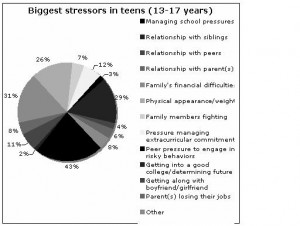DHS students cope with stress
 By Lauren Blackwell,
HUB Website Editor–
By Lauren Blackwell,
HUB Website Editor–
Everyone gets stressed out at one point in time or another. It is just a part of life.
Teenagers at DHS are no exception.
According to David Hafter, a clinical supervisor at Victor Community Support Services in Davis, teens will always be stressed; it’s part of being a teenager.
“There is going to be some grumbling, your body’s changing, your mind is changing,” Hafter said. “Your brain isn’t fully formed until [you’re in your] early 20s, and as mature as some teenager are and that sort of thing, you’re still going to look at things differently, no matter how mature you are.”
What stresses teens out?
There are many different causes of stress, and not everybody experiences stress from the same types of things.
“In Davis, the stressors that I see are more around academics and achievement,” Hafter said.
In a study conducted by the American Psychological Association (APA) in 2009, 640 teenagers (13to17-year-olds) nationwide were surveyed on what sources of stress impacted them the most.
The biggest stressor for teens was managing school pressures; 43 percent of those surveyed naming it as their main source of stress.
Senior Jenice Tupolo identifies school as one of her main causes of stress.
“I definitely feel more pressure this year to get better grades,” Tupolo said.
In contrast, Hafter also stated, “some kids respond to [academic pressures] by not participating.”
Hafter noticed that his son “was not willing to get into the high competitive academic grind.”
Hafter did not mind, however, and his son still graduated last year from DHS and is attending college this year.
Senior Emily May shares a similar philosophy as Hafter’s son.
May says she does not care about school and is not stressed out about it this year.
According to the APA study, 12 percent of those surveyed thought that managing extracurricular commitments was their biggest stressor.
Senior Arnell Rusanganwa plays on the men’s varsity basketball team and finds it hard to manage playing the sport with his schoolwork.
“Homework load stresses me out because I don’t always get enough time with basketball to finish it all up,” Rusanganwa said.
Junior Adam King played on the varsity football team in the fall and is also the junior class president.
“It’s never like one big thing that stresses me out,” King said.
The APA study also showed that 29 percent of the teens thought that getting into a good college was the most stressful for them.
Tupolo said that college applications are also a major factor in her stress this year.
“I want to believe [that there is no stress after apps are submitted], but what happens when I get my letters back? Like, am I getting into college?” she said.
Although she has not been stressed about applying to college, May shares Tupolo’s feelings about admittance into college.
“I’m afraid about not getting in anywhere,” May said.
How teens manage stress
According to Hafter, teenagers react to stress differently than adults, “usually depending on how their coping skills have already been set in place.”
They tend to have fewer coping skills than adults.
“Teens can tend to get agitated with stress, and so it can make them moody […] in how they deal with things,” Hafter said.
Often times, teens will cope with their stress in different ways, he stated.
“For some kids it will be losing weight, for other kids it will be gaining weight,” Hafter said. “For some kids it will be isolating, for some kids it will be sort of agitated behavior.”
Rusanganwa identifies with having an agitated behavior.
“I get really frustrated with things easily,” he said.
Hafter believes that there are many ways in which a teenager can manage his or her stress in a healthy way.
“One is to figure out how to identify your feelings, communicate your feelings, hopefully in a way that they can be dealt with,” he said.
According to Hafter, it is important to help teens manage their stress in ways that keep them safe, healthy, and out of trouble. He recommends finding a hobby or exercising as good ways to manage stress, as well asking for help when it’s necessary.
“It’s something that kids have a hard time doing, is asking for help. Adults have a hard time with it too,” he said.
Rusanganwa, however, chooses to confide in his friends when he is feeling stressed out.
“I usually talk to my friends about it and they help me manage things,” he said.
Hafter also believes, “dietary stuff makes a huge difference, because there are so many folks that are eating too much sugar.”
Eating too much sugar or carbohydrates can lead to weight issues, as well as causing teens to be pre-diabetic. It can also be a disadvantage in focus and concentration, according to Hafter.
Hafter also things it is important that teens do not turn to drugs and alcohol as a source of stress management. “If drugs and alcohol become your stress management technique then you’re kind of screwed without them,” he said.
Tupolo manages her stress through a variety of different methods.
“If things get ridiculously stressful, I’ll usually just stop and take a break, eat, and sing along to some music with my ukulele,” she said.
King tries to avoid getting too stressed. “My mom always says ‘things have a funny way of working themselves out,’ and luckily that’s pretty much been the case for me,” King said. “I try and stay calm and organized and just get the stuff done one way or another, and I make sure to always enjoy the good moments.”



